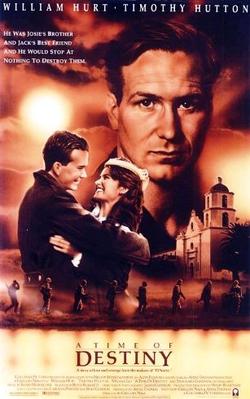| A Time of Destiny | |
|---|---|
 Theatrical release poster | |
| Directed by | Gregory Nava |
| Screenplay by | Gregory Nava Anna Thomas |
| Produced by | Anna Thomas |
| Starring | |
| Cinematography | James Glennon |
| Edited by | Betsy Blankett Milicevic |
| Music by | Music score: Ennio Morricone Featured music: Giuseppe Verdi |
| Distributed by | Columbia Pictures |
Release date |
|
Running time | 118 minutes |
| Country | United States |
| Language | English |
| Budget | $8,500,000 [1] |
| Box office | $1,212,487 |
A Time of Destiny is a 1988 American war drama film directed by Gregory Nava and written by Nava and Anna Thomas. The story is based on the opera La forza del destino by Giuseppe Verdi. The motion picture was executive produced by Shep Gordon and Carolyn Pfeiffer. It features original music by veteran composer Ennio Morricone.
Contents
- Plot
- Cast
- Distribution
- Filming locations
- Reception
- Critical response
- Soundtrack
- References
- External links
Set during World War II in Italy and San Diego, the film tells of two friends who become enemies during the war.